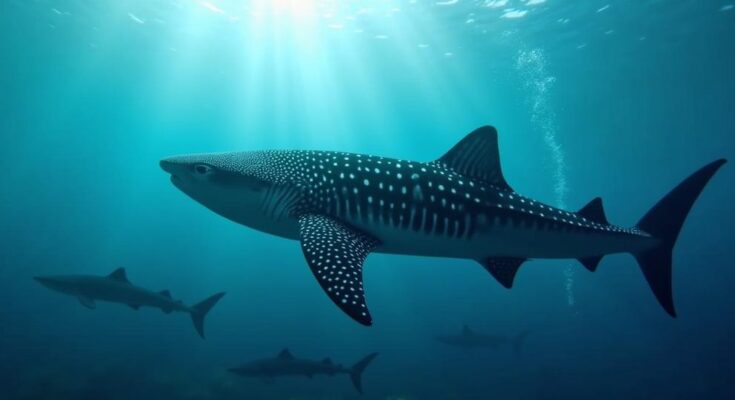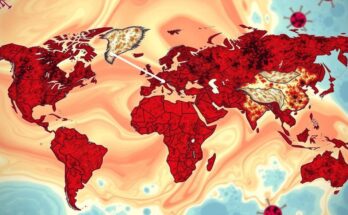A recent study predicts a potential rise in collisions between whale sharks and large ships due to global warming, which may drive these endangered species into new, busier habitats. Researchers project that by 2100, the likelihood of such encounters could increase by 15,000 times under high emissions scenarios, highlighting the urgent need for climate-centered management in marine conservation.
Recent research indicates that as global temperatures rise, the risk of collisions between whale sharks and large vessels may significantly increase. This study, published in Nature Climate Change, presents alarming predictions regarding the co-occurrence of these endangered creatures with busy shipping lanes due to the anticipated shifts in their habitat resulting from climate change. Researchers from the University of Southampton and the Marine Biological Association (MBA) assert that by the end of the century, encounters between whale sharks and large ships could surge by a staggering 15,000 times compared to current levels. Lead author Dr. Freya Womersley emphasized that areas experiencing high levels of emissions are likely to see the most severe habitat displacement. The whale shark, recognized as the largest fish species, exhibits remarkable mobility and is highly sensitive to temperature changes. Unfortunately, they are especially prone to injuries or fatalities from ship strikes—an ongoing challenge faced by many large marine animals worldwide. By utilizing satellite-tracking data alongside global climate models, the research team created projections for whale shark distribution under three differing climate scenarios. Notably, the models indicate potential habitat losses exceeding 50% in some national waters by 2100 under high emissions scenarios, particularly in Asia, while some European regions may experience habitat gains under sustainable development alternatives. The researchers also integrated these distribution projections with shipping traffic data, revealing that many newly identified suitable habitats for whale sharks intersect with bustling shipping routes, increasing the likelihood of dangerous encounters. Some regions, such as the Gulf of Mexico, may witness a decrease in these co-occurrences as sharks adapt to coastal areas, moving away from trafficked routes. Nevertheless, Professor David Sims highlighted that co-occurrence rates would rise across all climate scenarios, even if current shipping levels were maintained, let alone the anticipated increase in maritime traffic. In conclusion, this study underscores the pressing need to recognize the indirect effects of climate change on vulnerable marine fauna and how human activities exacerbate these impacts, reinforcing the necessity of considering climate factors in endangered species management discussions.
The study in question addresses the urgent concern regarding the impact of climate change on marine species, particularly the whale shark, the largest fish in the ocean. As ocean temperatures continue to rise due to global warming, it is becoming increasingly evident that many marine species may be compelled to shift their habitats in search of optimal living conditions, which often leads them into areas that intersect with heavy shipping traffic. This phenomenon not only places these animals at greater risk of collisions with vessels but also complicates conservation efforts aimed at protecting endangered species.
The findings of this research highlight a critical intersection between climate change and marine biodiversity, illustrating that increased ocean temperatures could necessitate shifts in whale shark habitats towards regions with prevalent shipping lanes, thereby elevating the risk of collisions. This underscores the importance of addressing climate change as an integral component of wildlife conservation strategies.
Original Source: phys.org




